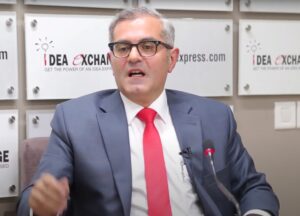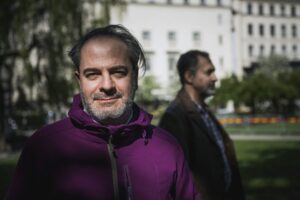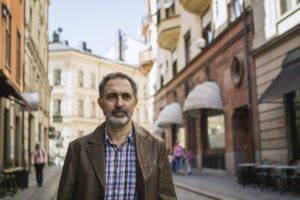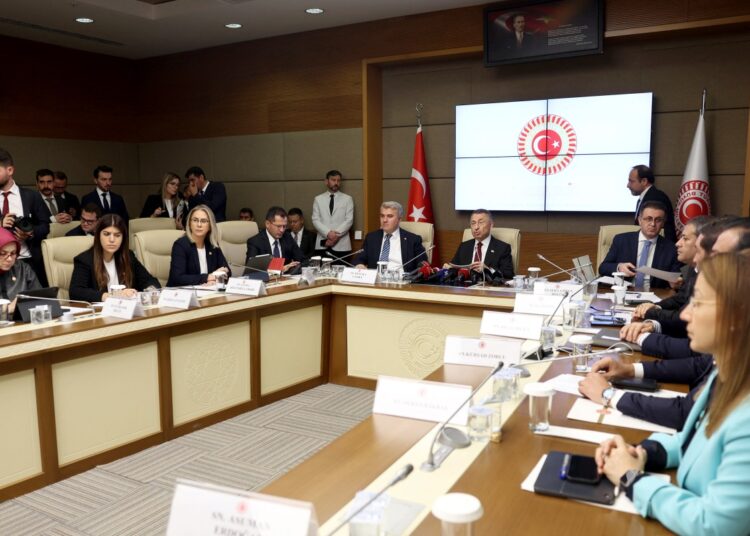Nordic Monitor/Stockholm
In the midst of prolonged and deliberately protracted negotiations between Turkey and Sweden concerning Ankara’s endorsement of the Nordic nation’s NATO membership bid, Turkish negotiators have introduced a scandalous demand by insisting that their Swedish counterparts agree to the closure of Nordic Monitor, an investigative news website based in Stockholm, managed by two exiled Turkish journalists.
The highly provocative request, apparently raised during confidential meetings between the Turkish and Swedish delegations, was inadvertently disclosed by Turkish Deputy Foreign Minister Burak Akçapar during deliberations at the Turkish Parliament’s Foreign Affairs Committee, which was tasked with reviewing Sweden’s NATO accession protocol on October 25.
“The Nordic Monitor issue is a serious matter. … Naturally, the closure of this is part of, and will continue to be part of, the negotiations we conduct with Sweden,” Akçapar informed lawmakers on November 16 while providing background information on the ongoing talks with the Swedish delegation to meet Ankara’s demands.
Nordic Monitor, established in Sweden by two Stockholm-based Turkish journalists, Abdullah Bozkurt and Levent Kenez, in 2019, is dedicated to in-depth coverage of Turkey through investigative journalism. The platform exposes the wrongdoings of the government of President Recep Tayyip Erdogan, considered to be in the public interest. Articles published by Nordic Monitor are frequently cited by global news media outlets, and its presentation of documentary evidence on the unlawful activities of the Erdogan government captures the attention of an international audience.
Both journalists, Bozkurt and Kenez, are members of the Swedish Union of Journalists (Journalistförbundet), a professional organization dedicated to promoting press freedom and advocating for the rights of journalists in Sweden.
In justifying Turkey’s demand for the closure of Nordic Monitor, Akçapar asserted that he and his colleagues at the foreign ministry have been singled out by the news website. He referred to a series of articles published by Nordic Monitor that revealed extensive surveillance activities conducted by Turkish diplomats in foreign countries.
Excerpts from the transcript of the debate at the Turkish Parliament’s Foreign Affairs Committee during which the Turkish deputy foreign minister revealed their attempt to convince Sweden to shut down the Nordic Monitor investigative news website:
Published documents have shown that numerous Turkish ambassadors conducted comprehensive information-gathering operations on unsuspecting critics of the Erdogan government in foreign countries. This information was then transmitted to headquarters in Ankara, resulting in various punitive measures against critics and opponents, even those in exile, as well as their family members in Turkey. Akçapar was among those identified in a spying operation in India during his tenure as ambassador in New Delhi, accredited to represent Turkey in several neighboring countries.
The exposé, revealed after examining hundreds of Turkish government documents, confirmed that Turkish diplomatic missions violate the domestic laws of host states and the principles of international law by conducting illegal information-gathering campaigns and extensive intelligence operations. Erdogan’s envoys enjoyed the privileges and immunities set forth in international conventions while systematically spying on critics of the president, collecting information on Turks living abroad and transmitting it to headquarters.
The immunities and privileges afforded to diplomats and consular staff are regulated by international conventions. However, diplomats, despite enjoying the privileges and immunities outlined in the Vienna Convention on Diplomatic Relations, are obligated to adhere to the laws and regulations of the host state. They are expressly instructed to avoid interference in the internal affairs of the host state as stipulated in Article 41. Similarly, consular staff, granted limited privileges and immunities by the Vienna Convention on Consular Affairs, can be subject to investigations and prosecution by host state authorities for crimes committed both inside and outside consulate premises, as outlined in Article 43 of the convention.
According to Akçapar, Turkey has obtained numerous concessions during talks with Sweden and Finland by compelling them to adopt several measures that would be advantageous to Turkey. He asserted that through the establishment of permanent joint mechanisms among the three countries, a prerequisite for Turkey’s approval for the launch of membership bids during the NATO summit in Madrid in June 2022, Turkey aims to extract further benefits from these nations.

In the context of Sweden, Akçapar contended that under pressure from Turkey, the country underwent a significant paradigm shift in its approach to terrorism. This shift is particularly noteworthy given that the Erdogan government has been accused of exploiting the concept of terrorism to indiscriminately detain its critics, including journalists, academics, activists and human rights defenders. As charges related to terrorism carry weightier penalties and longer prison sentences, the government directed the abusive criminal justice system to level such charges on individuals who have no connection whatsoever to violence or terrorism.
This practice sets the stage for self-censorship in Turkey and contributes to a sustained climate of fear. Turkey, with a troubling track record in freedom of the press, now ranks 165th among 180 countries in the Reporters Without Borders (RSF) 2023 World Press Freedom Index — a drop of 16 places from its 2022 ranking of 149th.
Numerous journalists find themselves incarcerated in Turkish prisons due to their professional work being deemed a threat by the government to Turkey’s constitutional order and counterterrorism campaign. According to the New York-based Committee to Protect Journalists (CPJ), Turkey’s independent media has been decimated by shutdowns, takeovers and the forcing of scores of journalists into exile or out of the profession.
Since 2014, following corruption cases that implicated Erdogan, his family members and close associates in a multi-billion dollar Iran sanction-busting scheme, the Turkish government initiated a severe crackdown on journalists and media outlets. The crackdown resulted in the closure of nearly 200 media outlets and the imprisonment of hundreds of journalists. Many journalists have been compelled to go into exile to avoid wrongful imprisonment, including Nordic Monitor editors Bozkurt and Kenez, who sought asylum in Sweden in 2016.
The Erdogan government’s campaign to suppress critical and independent journalists has extended beyond Turkish borders, with Turkish intelligence, foreign service and overseas institutions directed to target journalists living in exile. These journalists continue their professional work under threatening and challenging circumstances.

The Turkish deputy foreign minister made clear that Turkey would try to manipulate the joint security mechanism that was established at the ministerial level between Turkey and Sweden on the margins of NATO summit in Vilnius summit in July to extract more concession in the future even after Sweden becomes a full member of NATO. He said a roadmap on how to execute Turkey’s pending requests would be provided by Swedish authorities.
It seems that Nordic Monitor and its editors will remain in the crosshairs of the Turkish authorities, who have already taken various measures to pressure the exiled journalists into abandoning their profession and ceasing to write articles critical of the Erdogan government.
The Turkish government had previously submitted an extradition request for Kenez, but in December 2021, the Supreme Court of Sweden rejected the Turkish government’s appeal. The court ruled that Kenez’s journalistic work is not considered a crime in Sweden, dismissing the terrorism charges leveled by Turkey against the journalist.
Turkish authorities have issued multiple arrest warrants for Bozkurt over a number of articles he had written for Nordic Monitor. He is facing a criminal trial in Turkey on charges of insulting President Erdogan in an article he wrote about Muhammet Emin Tokcan, a convicted jihadist with a history of hijacking a ferry to Russia, involvement in conflicts in Chechnya and Georgia, orchestrating an assault on a luxury hotel in Istanbul and establishing an organized crime syndicate.
While Turkey has not yet formally requested Bozkurt’s extradition, there are indications that a request is in progress under the directive of the Justice Ministry. It is expected to be transmitted to Swedish authorities in the near future.

Both Bozkurt and Kenez have found themselves on the target list of Turkish intelligence agency MIT, which has expanded its operations in Europe. The agency is conducting surveillance and running aggressive intelligence-gathering activities in Europe.
In December 2016 Cem Küçük, a government propagandist with close ties to the Turkish interior and justice ministers, called on MIT to assassinate Bozkurt. Speaking on TGRT TV, a loyalist government media outlet, Küçük said Bozkurt’s home address in Stockholm was known by Turkish authorities and demanded the “extermination” of the journalist.
“No need to beat around the bush anymore. Where they [critical journalists] live is known, including their addresses abroad. Let’s see what happens if several of them get exterminated. How terrified would they be if you put bullets into the heads of some [critical] journalists,” he said.
Küçük was investigated in the past over Iranian Islamic Revolutionary Guard Corps (IRGC) Quds Force activities in Turkey, and Bozkurt’s writing on the Quds Force’s clandestine operations apparently bothered him.
Mesut Hakkı Caşın, the Turkish president’s advisor on security and foreign policy, openly threatened Bozkurt with murder on live TV, broadcast by a national television network, saying Turkish intelligence would find him and feed him to the sharks.
Speaking during a debate program on pro-government CNN Türk on January 15, 2021, Caşın targeted Bozkurt and said: “Turkish national intelligence will find him, I’ll tell you that. I don’t know whether MIT will feed him to the fish or the sharks, but traitors always ultimately get their punishment.”
Caşın, a 65-year-old professor and former military officer, is a member of Turkey’s Presidential Security and Foreign Policy Board advising Erdogan on strategic matters.
Bozkurt was attacked by three unidentified men in September 2020 in front of his home in a Stockholm suburb and had move to a safe location. His address and private information were kept secret under Sweden’s laws protecting vulnerable persons. During the attack, he suffered scrapes and bruises to his face, arms and legs and was treated at a local hospital and then released.
On October 10, 2022 MIT leaked secretly taken photos of him to the Sabah daily, a regime mouthpiece that is owned by Erdogan’s family. His until-then-secret home address was revealed as a continuation of an ongoing Turkish government strategy aimed at harassing and intimidating the journalist. A few weeks later, MIT leaked surveillance photos of Kenez to Sabah as well.
Turkish president’s letter to the speaker of parliament, on October 23, 2023, asking for the ratification of Sweden’s NATO accession protocol:












